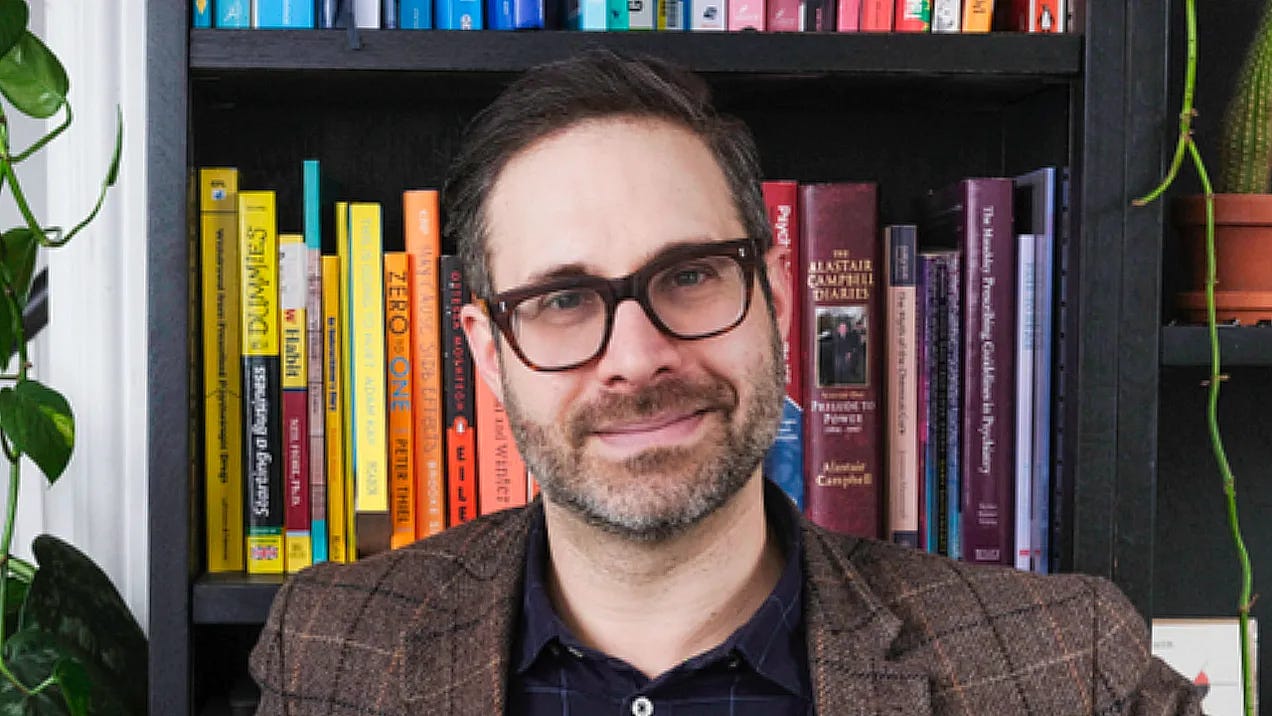Antidepressant withdrawal—why do researchers keep downplaying it?
A new study claims antidepressant withdrawal symptoms are mild and short-lived. But for many, the suffering is real—and long-lasting.
When a major study appears in JAMA Psychiatry—a high-profile journal that shapes headlines and clinical decisions—its findings carry weight.
So when Kalfas and colleagues released what they billed as the most comprehensive analysis of antidepressant withdrawal to date, it drew immediate attention.
The study concluded that symptoms were generally “mild,” short-lived, and possibly amplified by nocebo effects—positioning itself as the last word on the subject.
The authors mobilised a rapid media campaign to shape the public narrative, with the Science Media Centre issuing expert commentary to “reassure both patients and prescribers” that most withdrawal symptoms were “not clinically significant.”
But for grassroots advocates who’ve spent years exposing the realities of withdrawal, the study felt like a gut punch. They argue it presents a dangerously misleading picture—one that could entrench outdated practices and delay long-overdue reform.
“The idea that withdrawal is rare or mild is a manufactured consensus based on industry-aligned data,” said Morgan Stewart of the advocacy group Antidepressant Coalition for Education. “This is a misleading analysis of antidepressant withdrawal.”
A flawed foundation
Kalfas et al. conducted a systematic review and meta-analysis—methods widely regarded as the gold standard in evidence-based medicine. It examined 50 studies involving more than 17,000 patients.
But these reviews are only as reliable as the data they include. If the underlying studies are biased or poorly designed, the result is what critics call “garbage in, garbage out.”
That’s exactly what happened here.
Most antidepressant trials last just a few weeks or months, even though many people take these drugs for years. In the U.S., for example, half of all antidepressant users have been on them for more than five years. Short-term trials are of little relevance to this population.
Worse, many trials enrolled patients already taking antidepressants—then abruptly withdrew them before randomisation. As a result, those assigned to placebo experienced withdrawal symptoms that blurred the difference between treatment and control groups, artificially minimising the harms.
This sleight of hand isn’t new. It exploits a structural weakness of placebo-controlled trials, which are ill-equipped to capture the real-world challenges of stopping antidepressants.
Kalfas et al. found that people who stopped antidepressants reported, on average, only one more symptom than those who stayed on treatment or placebo. But the study didn’t assess symptom severity and followed patients for just two weeks.
That’s not long enough. Many patients report that symptoms don’t emerge until after that timeframe, so the study simply fails to reflect what happens in real life.
To make matters worse, most of the included trials were industry-funded and underrepresented commonly used medications such as paroxetine, or escitalopram, which is known for causing severe withdrawals.
What patients experience — and why doctors misinterpret it
In 2024, Danish physician Peter Gøtzsche and I conducted our own systematic review, published in the International Journal of Risk & Safety in Medicine. We examined interventions used to help patients taper off antidepressants.
We found success rates ranging from 9% to 80%, with a median of just 50%. Many participants described their symptoms as “severe.”
Crucially, our meta-regression showed that longer tapering durations significantly increased the chances of success.
Yet doctors often mistake withdrawal symptoms—like anxiety, insomnia, dizziness or low mood—for relapse. Patients are told their depression has returned, and the drug is reinstated.
In reality, these symptoms are often physiological responses to withdrawal. But too often, patients are gaslit by a system that refuses to acknowledge the problem.
Laura Delano’s story
Laura Delano knows this experience intimately. In her memoir Unshrunk, she recounts how she was diagnosed with bipolar disorder at age 14 and spent over a decade on a cocktail of psychiatric drugs.
It wasn’t until she broke free from the psychiatric system that she realised she wasn’t “treatment-resistant”—the problem was the medications themselves. That realisation marked the beginning of a long and difficult journey to taper off the drugs.
“Coming off psychiatric drugs had been the hardest thing I’d ever done,” she writes.
Today, Delano helps others navigate the withdrawal process through her non-profit Inner Compass Initiative. Her husband, Cooper Davis, who also serves as the organisation’s executive director, says the Kalfas study downplays the problem.
“This study confuses the absence of evidence with evidence of absence,” he said. “Long-term, severe withdrawal is real, and it’s simply not captured in the dataset they chose to work with.”
The timing of the study—coinciding with growing awareness of withdrawal harms and the recent release of Unshrunk—has led some to wonder whether it is part of a coordinated effort by industry to protect the status quo.
Hyperbolic tapering: why small doses still pack a punch
Most clinical guidelines still recommend tapering schedules that are biologically inappropriate—halving doses every few days or weeks.
But the brain doesn’t adapt to antidepressants in a linear way.
At lower doses, even tiny reductions can cause major symptoms. That’s why many experts now advocate for hyperbolic tapering, where reductions get smaller over time. Some patients need a year or more to taper safely.
It may sound extreme, but it’s common for people to file down pills, dilute liquids, or use precision scales to reduce doses by a fraction of a milligram.
Dr Mark Horowitz, a Clinical Research Fellow in the UK’s National Health Service and a leading advocate for safer deprescribing, told me during his Australian lecture tour last year that, for many, antidepressant withdrawal can be worse than the condition the drugs were originally prescribed to treat.
His own experience was a wake-up call. When he attempted to come off escitalopram after more than a decade, he endured months of akathisia, terror, and disassociation.
“I quickly realised that what was described in textbooks and published studies didn’t reflect at all what was happening on the ground,” he said.
Horowitz explained it’s like speeding down a highway and suddenly yanking the handbrake—you’re going to crash. “You have to slow down gradually, especially at the end,” he said.
Change is happening
The push for change is gathering pace.
The Royal Australian College of General Practitioners recently endorsed the Maudsley Deprescribing Guidelines, an evidence-based resource designed to help GPs—the main prescribers of antidepressants—manage safe withdrawal.
In the UK, the Royal College of Psychiatrists has also acknowledged the severity of withdrawal. In 2020, then-president Wendy Burn penned a mea culpa in The BMJ conceding that the College had “not been right” and wanted to recognise “the difficulties that can arise for some people when coming off antidepressants.”
In 2023, Burn went further, apologising on BBC Panorama for not acknowledging the harms of withdrawal sooner.
A national priority for reform
In the US, scrutiny of psychiatric drugs has become a priority of the Make America Healthy Again (MAHA) Commission, led by Health Secretary Robert F. Kennedy Jr.
At its inaugural meeting, the Commission listed SSRIs and other psychiatric drugs among the top public health threats.
The move sparked political backlash, with Senator Tina Smith accusing Kennedy of stigmatising people with mental health conditions and potentially discouraging them from seeking care.
But Kennedy never called for abrupt discontinuation—he called for research, transparency, and accountability.
“I know people, including members of my family, who’ve had a much worse time getting off of SSRIs than getting off of heroin,” he said at his confirmation hearing.
Critics called the comparison offensive. But many clinicians agree that SSRI withdrawal can be more painful, and last far longer, than opioid withdrawal.
Many patients stay on antidepressants—not because they still need them—but because coming off them is too agonising.
No more denial
It’s not scientific to dismiss patient experiences. It’s not evidence-based to draw conclusions from 12-week trials about drugs that are often taken for 12 years. And it’s not ethical to keep prescribing them without fully disclosing the risks.
That’s exactly where the Kalfas study falls short. By relying on short-term, industry-funded data and ignoring the lived reality of withdrawal, it downplays a public health crisis hiding in plain sight.
The truth is, starting an antidepressant is easy. But stopping can be the hardest part.
And the longer psychiatry denies that truth, the more damage it does.
Press release: The Beyond Pills All-Party Parliamentary Group (APPG) response










Hi Maryanne. I wanted to introduce myself because I’ve been a leading voice in the withdrawal/overmedicating kids space for years, and work closely with many of the folks you mention.
Your coverage on the topic has been excellent, and I’ve been so grateful given most of the folks with lived experience, like myself, have been shouting into the void for years.
I published my own overview of this atrocious study this morning, and my substack is dedicated to antidepressant withdrawal education, recovery, and the unintended side effects of medicating kids.
Keep going. I will too.
-Brooke
https://brookesiem.substack.com/p/152-garbage-in-garbage-out-every
Once again anecdotal evidence, but in my medical practice I see numerous patients on antidepressants, usually SSRI's or SNRI's, who remain on them in perpetuity due to the severity of side effects when trying to wean off them.
I remember clearly in my general practice days being told these new wonder drugs were not addictive.
As always, follow the money.